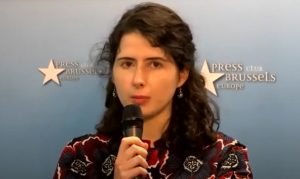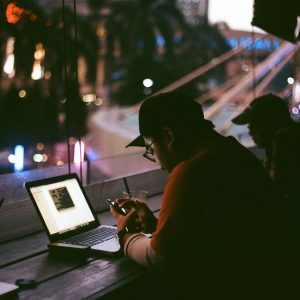29 Apr 2022 | China, Media Freedom, News, Russia, Ukraine
Physical attacks on journalists have increased dramatically over the past year, according to the latest annual report from the Council of Europe Platform on media freedom in Europe.
The platform, of which Index on Censorship is a partner, reports on serious threats to the safety of journalists and media freedom in Europe in order to reinforce the Council of Europe’s response to the threats and member states’ accountability.
The new report, Defending Press Freedom in Times of Tension and Conflict, reveals that the number of cases involving the safety and physical integrity of journalists has jumped by 51% year-on-year, with 82 cases reported to the platform.
Many of the attacks on journalists have taken place during public protests.
“Violence against journalists during street protests is fed by a wave of media bashing and an avalanche of hate speech on social networks – very often prompted by political figures – which directly target journalists, questioning their independence and legitimacy and therefore making them more vulnerable to physical aggression,” the report says.
Overall, the number of alerts in all categories published by the CoE platform has sky-rocketed to 280 in 2021, up from around 200 in 2020 and more than double the level reported in 2016. Of the 280 alerts, 110 related to the harassment and intimidation of journalists.

Index’s policy and campaigns manager Jessica Ní Mhainín
Speaking at the launch of the report, Index’s policy and campaigns manager Jessica Ní Mhainín highlighted cases of impunity in CoE’s report.
“Impunity for crimes against journalists refer to failure of states to identify, prosecute and punish anyone including the assailants and masterminds involved in committing a crime against a journalist,” she said. “Cultures of impunity contribute to self-censorship by making journalists more vulnerable to pressures out of fear of reprisals or harm.”
Some 35 cases of impunity have been registered on the platform since 2015 and two new impunity cases – those of Turkish journalist Uğur Mumcu, murdered in 1993, and Turkish-Cypriot journalist Kutlu Adalı, murdered in Cyprus in 1996 – were added to the impunity category during the year.
“In 2021, we welcomed the Slovak Supreme Court’s decision to overturn the not-guilty verdicts of the suspected masterminds of the 2018 murder of journalist Ján Kuciak and his fiancée Martina Kušnírová. The case will be heard in the Specialized Criminal Court later this year,” said Ní Mhainín.
Last year also saw the publication of a 438 page-report from the public inquiry into the assassination of investigative journalist Daphne Caruana Galizia, which concluded that the state of Malta “must bear responsibility for the assassination because it created an atmosphere of impunity”.
“We once again call on the Maltese authorities and the Commission of Experts to implement the recommendations of the Public Inquiry,” said Ní Mhainín.
Russia, Turkey and Ukraine account for 60% of all the cases relating to impunity on the platform. Last October marked the 15th anniversary of Russian journalist Anna Politkovskaya’s murder.
Ní Mhainín said, “The masterminds of her murder are still at large, sending the incredibly dangerous message that killing a journalist is a low-risk crime.”
Yet impunity is not restricted to these countries.
A BBC Spotlight investigation has uncovered serious concerns over the police investigation and the failure to prosecute those behind the murder of Irish journalist Martin O’Hagan, who was killed in September 2001 for his reporting on paramilitary activities in Northern Ireland. The concerns raised in the programme, which aired on 2 March 2022, came in the wake of several Police Ombudsman reports that uncovered collusive behaviour between the police and loyalists in Northern Ireland. According to the BBC’s investigation, police did not act on important information – including individual names – that were handed over to them within 48 hours of the murder. The journalist’s family are now taking legal action against the Police Service of Northern Ireland (PSNI) and the Ministry of Defence.
“Press freedom is the canary in the coal mine – it is a key indicator of the clear and worrying degree of democratic backsliding that is taking place across Europe,” said Ní Mhainín. “That’s why we once again call on Council of Europe member states to ensure that the highest priority is given to conducting thorough and transparent investigations into all crimes against journalists and we remind member states of the 2016 Recommendation of the Committee of Ministers which requires states ‘adopt appropriate criminal law provisions to prevent impunity’”
22 Apr 2022 | China, Digital rights, News, Russia, United States
A new report from civil rights group GreatFire has revealed that Apple acts on virtually every takedown request it receives from the Chinese and Russian governments for apps in its App Store, a far higher compliance rate than with requests from other governments.
The report, Taken Down: A Look into Apple’s Transparency, is published this month as part of GreatFire’s AppleCensorship campaign. Written in collaboration with Apple whistleblower Ashley Gjovik, it reveals that the tech company receives an app “takedown” request from a government every 2.5 days on average and removes an app from the App Store every 16 hours. Overall, Apple complies with 74% of these requests, but in the cases of China and Russia the rate is 98% and 95% respectively.

Apple whistleblower Ashley Gjovik is co-author of the new report
Gjovik, who wrote the report’s foreword, was fired by Apple after complaining about toxic waste under her office. Her case was first raised by Index last year. She said of the findings: “Human rights are not determined by borders on maps, or by borders between the physical and online worlds. Freedom of expression is a fundamental right which must be protected: everywhere. Private corporations should not be allowed to deprive people of their rights, nor should we tolerate off-the-record, backroom discussions between corporations and authoritarian governments. We must demand transparency, respect, and dignity.”
Benjamin Ismail, AppleCensorship project coordinator and GreatFire’s campaign and advocacy director, added: “[Apple] must acknowledge the deeply flawed management of its App Store and start taking the necessary steps to prevent government-led and corporate censorship from depriving millions of users of their fundamental rights to access to information and freedom of expression.”
The report calls for more detailed disclosures in Apple’s Transparency Reports, which simply publish the number of take-down requests and the number of apps removed but provide no further information. There is no information, for instance, about the apps themselves, what laws they are alleged to have breached or the legitimacy of the government requests.
Ashley Gjovik first began to raise questions about toxic vapour intrusion under her office, which, like much of Silicon Valley, was built on polluted industrial land. She had become ill after discovering a similar problem under her apartment block and began to ask questions when Apple staff were asked to return to work after the Covid-19 pandemic.
After a six month battle over the contamination, her contract was finally terminated on the grounds that she had disclosed “confidential product-related information”. This refers to concerns Gjovik raised about experiments carried out on Apple employees involving facial identification and studies of ear canals. Gjovik now believes the corporation retaliated against her for raising her concerns about the risk to her and her fellow employees from the pollution. But instead of walking away she has continued to pursue Apple over its record on safety, privacy and labour rights, both in the United States and Europe.
Gjovik, who was training as a lawyer while working at Apple and now specialises in human rights law, has since taken on numerous cases against Apple. She told Index: “They all focus on one end goal: initiating a serious, global conversation about how to reset domestic and international relationships with these megacorporations. We need to demand transparency, accountability, legal compliance and a workforce that is treated with dignity.”
22 Apr 2022 | Afghanistan, China, France, Israel, Opinion, Palestine, Russia, Ruth's blog, Ukraine, United States
I regularly start my weekly blog with the exclamation “there is just too much news!” Too much horror and heartbreak and this week the assertion is all too true.
Russia has invaded a sovereign country and daily we are seeing evidence of war crimes on the continent of Europe; China is arresting yet more democracy activists on the flimsiest of excuses; there have been bombings targeting schools in Afghanistan; a neo-fascist is, yet again, in the final run-off in the French Presidential elections; there are riots in Sweden against the far-right with dozens hurt; people are starving in Shanghai under Covid-19 restrictions; there is active conflict again in Jerusalem, with over 150 Palestinians hurt in clashes after a series of terror attacks targeting Israelis in recent weeks; another video of a black man being fatally shot by the police has emerged in the US – Patrick Lyoya was killed, while being held on the ground, defenceless, on 14 April and riots have followed in Michigan.
Our team at Index is working on every one of these news stories. We work with people on the ground, and we commission dissidents and writers, in country, to give us a first-hand account. In the twenty-first century we can speak to people in every corner of the globe, as events are happening, because of the internet and the social media platforms which afford us all a level of protection because of end-to-end encryption. We work with people on the ground who would be arrested, tortured, or even killed because they want to share their experiences with the world. They want the world to know what is happening to them and to their communities. They are on the frontline in the perpetual fight for our democratic right to freedom of expression. They are vulnerable because of who they are and what they want to share with us, whether that’s their writings, their opinions or their art.
They are brave and inspirational and determined to stand up for what is right. For as long as they want to tell their stories there is a moral onus for us to listen to them.
Which brings me to the current proposals to regulate our online lives currently being progressed in the European Union and in the United Kingdom. In Europe, today (Friday) the final negotiations on the substance of the Digital Services Act are underway and, in the UK, the Online Safety Bill began its parliamentary journey on Tuesday. Index is working actively with partners to try and mitigate the worst aspects of both pieces of legislation and we were in Brussels this week to make the case for additional protections for freedom of speech. Our overriding goal is to make sure that our access to those brave dissidents is protected and that our rights to discuss the detail of these horrors are protected. To make sure that while legislators are trying to ‘protect’ us online they don’t end up inadvertently silencing us.
Index advocates for free expression within the protections afforded to us by the European Convention on Human Rights. There is no right not be offended. There is no right not to see things online, or in real life, that will upset you. Of course, we all want to protect each other from seeing the worst aspects of human life – that’s an admirable aspiration but it isn’t the grounds for making new law. In fact, it’s the exact opposite – legally we have protected freedom of expression, it’s a fundamental right. I have written before about our concerns regarding online regulation and in the coming months I’ll be writing extensively on it – but we start with the basic principle – what is legal to say should be legal to type. And that should be the case whatever any new legislation seeks to amend.
14 Apr 2022 | China, Covid 19 and freedom of expression, News
Shanghai, a normally buzzing, dynamic city of 25 million, is in week three of an intense lockdown as part of President Xi Jinping’s desire to keep the country “Covid-Zero”. It’s buckling at the knees, so much so that they’ve had to ease measures in some areas. The desperation is in large part due to how mismanaged the lockdown has been. Shanghai authorities’ promises of providing necessities to those confined in their homes have not been kept, leaving many residents starving.
“Pets beaten to death. Parents forced to separate from their children. Elderly folks unable to access medical care. Locked-up residents chanting ‘we want to eat’ and ‘we want freedom’,” ran the lead in a Bloomberg article last week.
As anger bubbles over, the censors are working overtime.
The phrase “buying vegetables in Shanghai”, a video showing mountains of food waste, a post written by Ho Ching, wife of the prime minister of Singapore, calling the Shanghai lockdown “a waste of time, money, resources and opportunities” are just three examples of content that has been censored in the past few weeks in China.
“I am not particularly concerned about politics, and I believe many other ordinary people are the same. Most people just want a safe and comfortable land to live in.” The words of another netizen whose post was blocked. These words speak volumes. Shanghai residents’ desire to post, and particularly post under popular hashtags, isn’t necessarily about making a grand political statement. It’s about a sense of unity at a moment of desperation. It’s a cry for help. It’s a way to pool resources and offer tips.
The intense lockdown, and the government’s response to criticism of it, is deeply disturbing. At the same time it follows a depressingly familiar pattern. Beijing has been pursuing a draconian Covid control policy from the start and censorship has been the government’s bedfellow. Remember Li Wenliang, the Covid doctor who was hunted down for blowing the whistle on the virus?
The censorship we are seeing fits perfectly into the Chinese model that only allows for minimal criticism of policy from the top. And the posts, while not always directly pointed at senior leaders, clash with what they fear the most – collective action. As outlined in 2012 by a Harvard study of Chinese censorship any posts with a hint of collective intent are targeted. One example in this study came from Zhejiang Province. There, following the Japanese earthquake and the subsequent meltdown of the Fukushima nuclear plant, a rumour spread that iodine in salt would counteract radiation exposure. To offset a hectic dash to buy salt, all online content was removed. Yesterday’s iodine in salt is today’s vegetables in Shanghai.
Many are now too scared to speak online about their situation in case they get the dreaded knock on the door. They know the internet police are watching. Some have made the brave move to switch on a VPN, even though VPNs are banned in China. They really want to know exactly what is happening in their city, outside of their own four walls. Who can blame them? By this stage it’s confusing to even know what is happening in Shanghai on a purely clinical level because we simply can’t trust the numbers. Just how many people are currently ill? How effective is the Chinese vaccine against Omicron, and other variants for that matter? The official line says vaccine uptake among the most vulnerable has been low. Exactly how low?
Without knowledge of the real stats, it’s hard to see justification for the lockdown and harder still justification for such an extreme one. As for the blocking of posts related to it that’s condemnable no matter the content or circumstance. Ultimately it feels like we are watching an elaborate show of Xi’s stranglehold on the country. Perhaps that’s the point? This though is a view that can’t be shared on Weibo. Or at least not for long.



